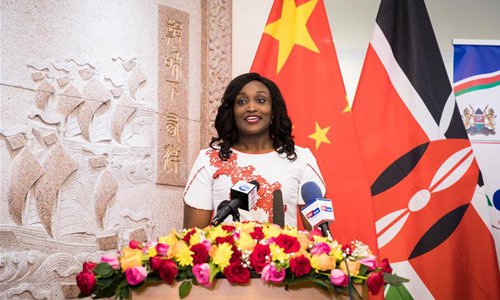
Nancy Wangari Ndirangu, director of Centrofood Industries, delivers a speech concerning her experience of attending the China International Import Expo during a reception held in Nairobi, Kenya, Nov 16, 2018. (Photo: Lyu Shuai/Xinhua)
China's rising power and influence comes with more responsibility. The country is expected to take international responsibilities matching its power and influence. While there are no strict guidelines on big power responsibility, the powers are expected to shoulder responsibilities that include financial, humanitarian, global governance and politics, international security etc. Weak and small states look up to big powers to show leadership, promote equality and social justice and drive the global development agenda.
Much of the Western world is suspicious of China's motives and believes the Asian power is plotting world domination so as to control resources and commodities especially in Africa where it has taken a prominent role.
One of the initiatives taken by China to strengthen global commerce and trade is the Belt and Road Initiative which comprises of the Silk Road economic belt and the Maritime Silk Road initiative that involve billions in investment and infrastructure development linking Southeast Asia, the Middle East and Africa. The initiative has generated enthusiasm and high hopes as well as skepticism and doubts in some places.
Kenya stands as a focal entry point of the Maritime Silk Road initiative in Africa translating into increased interest from Chinese investors who see it as an important entry point in the East African sub-region and the continent. China is now Kenya's largest source of foreign investment and second largest trade partner. Most of Kenya's new flagship projects, some complete and others ongoing, are related to this initiative.
While criticisms of China and its activities in Kenya may be based on long held negative perceptions, exaggerations and sensationalism based on isolated cases, it points to Kenyan's expectations that China take responsibility in its dealings with the country's leadership and policymakers. Kenya and other African countries lag in economic growth and development due to poor political stewardship that is conscious of the economic imperatives that are needed to spur up economic growth and lead to prosperity.
While foreign direct investment was critical for China's success, it adopted macroeconomic strategies that promote local capacity and ensure that the local private sector is protected until they can stand alone and compete with multinationals.
Some Kenyans are angry at the country's state of affairs and hope China can help improve its governance. During the country's Independence Day celebrations on December 12, 2019, President Uhuru Kenyatta urged Kenyans to buy Kenyan products and support the local industries. This call was followed by harsh criticism from large sections of the online populace with the hashtag #BuyKenyaBuildKenyaLies castigating the government and the entire leadership for failing to protect Kenyan industries and products from what they consider unfair competition from foreign investors.
While these sentiments and the images posted mostly refer to isolated incidents, they reflect certain frustrations among the population, especially young Kenyans who cannot find jobs and utilize their talents and expertise and participate in national development.
While the relationship between China and Kenya keeps improving, it is imperative that Beijing offer leadership and strive to generate public confidence in its engagement with the country's leadership. Whether these sentiments represent the actual nature of the relationship, it points to a communication gap and a lack of shared values and common aspirations with the people. Big power responsibility compels China to use its economic influence to foster harmony between the Chinese people and Kenyan people.
China walked out of poverty and is trying to help other regions and countries that face the same problem. The technology used to tide over the problem and the experience of dealing with it can be useful. Cooperation between China and African countries can boost joint development instead of one-way capital flow as seen during the empirical era. African countries should draw lessons from China's development and forge their own independent path.


